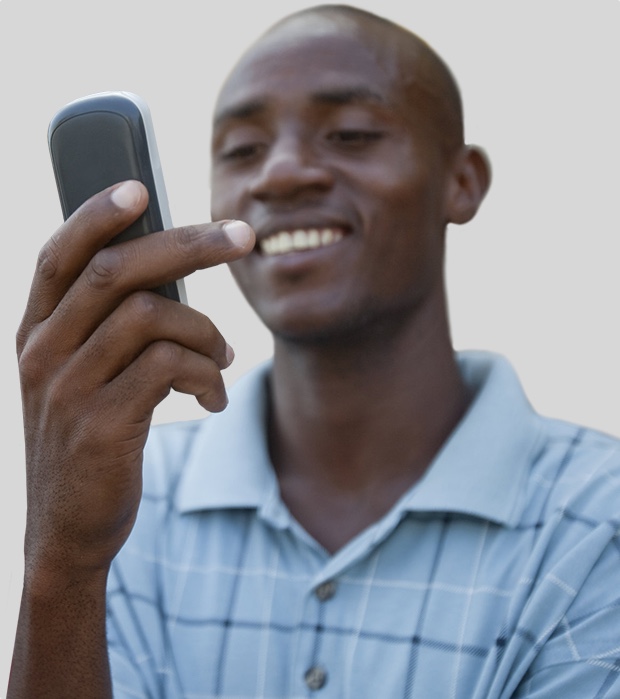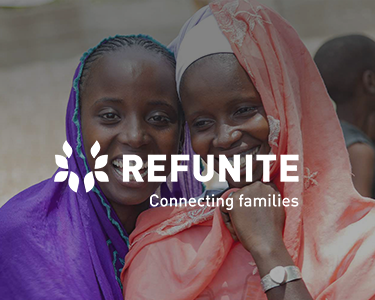Christopher and David Mikkelsen, co-founders of Refugees United, reflect on key milestones in 2013 that brought Refugees United closer to its goal of bringing one million refugees onto the platform by 2015.

More than a quarter of a million refugees and forcibly displaced people worldwide are now registered on the mobile phone family-tracing platform pioneered by Refugees United. That’s five times the number our organization reached in October 2011. This milestone comes at a time when more than 45 million people have been forcibly displaced around the world.
In the face of widespread forced displacement, Refugees United and partners worked hard in 2013 to restore hope to those missing lost loved ones.
At Refugees United, we believe that everyone has the right to know where their family is. That’s why we’ve developed a search service that allows separated families to take the search for missing loved ones into their own hands using simple mobile phones.
2013 was a dynamic year for our small team, full of new partnerships, countries and innovations. Our nimble crew of 19 people launched several new initiatives, which have made it easier for separated refugee families to search, connect and communicate.
These new initiatives have a transformative potential in Africa and beyond. Out of the world’s seven billion people, more than five billion have access to a mobile phone. In Africa, mobile phone penetration is skyrocketing, but levels are still a fraction of what they are in the more developed regions. Families often share a single phone and connectivity blackouts are rampant.
In most places outside of major cities, connecting wirelessly to the Internet is virtually impossible. An estimated four billion people in the world are without access to the Internet. These are some of the challenges we sought to address in 2013.
Through Refugees United’s mobile platform, a simple SMS becomes a lifeline that connects a disconnected person with the rest of the world, including missing friends, family, and community. Millions of data points, such as tribes and clans, places last seen, personal traits such as tattoos or scars, are securely paired, locating matches for the 250,000+ refugees already registered on our platform.
This approach allowed us to reconnect new families in 2013 and witness family reconnections first hand. Among other stories, we met a Somali woman who was reconnected with her father and brother after 22 years of separation. They were separated when the war broke out in Somalia, and were reconnected through Refugees United in March 2013. This story is just one of many that we cherish.
We would like to thank our extraordinary partners for their commitment. We commend our funders, IKEA Foundation and Omidyar Network, as well as our key strategic partners: Ericsson, Safaricom, Vodacom DRC, Telesom, the UN Refugee Agency (UNHCR), Kenya Red Cross Society and Tanzania Red Cross Society.
As the year draws to a close, we are pleased to highlight key initiatives from 2013:
- Launching new SMS campaigns: To reach more families searching for missing loved ones, we have launched major SMS campaigns in DRC, Somaliland and Kenya, together with Vodacom DRC, Telesom, Safaricom and Ericsson. We are targeting refugee camps and urban areas with high refugee populations. The response has been overwhelming. In 2013, we distributed 1,567,000 text messages.
- Launch of a ’Global Hack for Good’ in Nairobi, Cairo and Silicon Valley: Together with Ericsson, our lead technology partner, we galvanized developers to design solutions for separated families. The winning solutions included an Interactive Voice Response solution for illiterate people, a ‘Message Wizard’ that allows users to create messages faster, and an offline application that allows for on-ground registrations in areas with poor connectivity. The winners will travel to a refugee camp in 2014 to test their prototypes. 20 project ideas where generated, and 60 students and professionals each donated a weekend pro bono work.
- Launch of a USSD mobile application in Kenya: 2013 also saw the launch of our simple, multi-lingual mobile application (known as ‘USSD’ among techies). This application, built by Refugees United, Ericsson and Safaricom, allows families in Kenya to access our platform without the Internet and will be replicated in other countries soon. Users in Kenya can search for missing family by dialling *883#.
- Launching toll free numbers in Kenya, DRC and Somaliland: Working with Safaricom, Telesom and Vodacom DRC, families can now call our call center free of charge. Families in DRC can call 62014, families in Somaliland can call 169, and families in Kenya can call 0800 724 882.
- Launching an international call center in Kenya: We have been overwhelmed by the number of calls we have received since opening our international call center in Nairobi – a cheap and efficient way of registering families. We have received calls from 123,091 people since we launched the call center in June this year.
- Launching 22 radio campaigns in camps: To generate awareness on the ground, we have launched several radio campaigns in Kenya, Somalia and DRC. Refugees living in remote areas have called our call center after having heard about Refugees United on the radio.
- Launching new mobile programmes in refugee camps: Our partnership Kenya Red Cross Society allowed the launch of on ground operations in the two largest refugee camps in Kenya. We now have more than 125 outreach volunteers in Dadaab and Kakuma refugee camp. Together with Interaid, we now have four outreach coordinators in Uganda. Our volunteers are refugees themselves who register people in need from their communities.
- Launch of a “Family Is” campaign with Google+, Mashable, RYOT news and UNHCR: Our Google Hangout on Air series allowed viewers around the world to witness separated family members speaking to each other for the first time in years. The campaign culminated in November 2013, where we participated in the first ever live “Hangout-A-Thon”, a 12-hour event on Google+ and Mashable.
- Launch of a nation-wide comic book campaign: In coordination with Well Told Story, we launched an awareness campaign to connect young people to their missing loved ones. 670,000 comic books where distributed across Kenya, and the six special Shujaaz radio shows aired 156 times across 26FM stations.
- Ramping our tech team in Kenya: In 2013, we established ourselves in Nairobi. We work from 88mph, a start-up hub, and continue to strengthen our tech team with new hires (i.e. former employees from mobile companies in Africa as well as Google in Africa.) Our new team members bring invaluable tech skills and a honed understanding of the challenges our users face.
- Launching two new film projects: Together with Ericsson, we launched a new animation film “Estelle’s Story,” which is narrated by Refugees United’s Goodwill Ambassador and actor, Mads Mikkelsen. Working with FilmAid, we launched a new film pilot recorded at Kakuma Refugee Camp.
- Building trust in local communities: We hosted several community forums in the field. Thanks to their endorsement, we have been able to overcome barriers pertaining to language, culture, and religion. Highlights included our outreach events on World Refugee Day, in Goma, Nairobi, Dadaab, Kakuma and Cairo. In September, our Ambassador, Emmanuel Jal, performed at Kakuma Refugee Camp to raise awareness of Refugees United.
- Sharing knowledge at international events: In 2013, our team also took time to partake in the SIME conference in Stockholm, Net Impact and Digital Leaders in Silicon Valley, the launch of World Disaster Report 2013 at iHub, Social Media Week and DANSIC 13 in Copenhagen, the Mobile for Development Conference in Cape Town (GSMA), Techonomy in Tucson, Arizona, and lectures at New York Stern School of Business.
- Receiving international recognition: In 2013, Refugees United was awarded a Lovie for our short documentary “Lost and Found,” an Award of Excellence by Communicator Award as well as an Award of Distinction by Prix Ars Electronica. Refugees United was featured in BBC, Forbes, National Geographic, and more.
In short, 2013 was a great year for our small organization. As we venture into 2014, we stay mindful of the fact that separation from family only takes a moment, but leaves a lifetime of hurt. Access to information is the invisible wall that keeps a family divided. Through Refugees United, this barrier can be broken down, one SMS at a time.
Photo: Innovative developers gather for Refugees United’s Global Hack for Good in Kenya.


